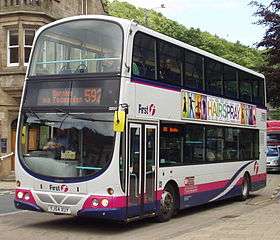Volvo B7TL
| Volvo B7TL | |
|---|---|
 First West Yorkshire Wright Eclipse Gemini bodied Volvo B7TL | |
| Overview | |
| Manufacturer | Volvo |
| Production | 1999-2006 |
| Body and chassis | |
| Doors | 1 or 2 door |
| Floor type | Low floor |
| Powertrain | |
| Engine | Volvo D7C (7.3 L) |
| Power output | 215 hp (160 kW) / 250 hp (186 kW) |
| Transmission | Voith DIWA/ZF Ecomat |
| Chronology | |
| Predecessor | Volvo Olympian |
| Successor | Volvo B9TL (2-Axle) |
The Volvo B7TL is a low-floor double-decker bus which was launched in 1999 and replaced the 2-axle version of the Volvo Olympian (its 3-axle version was replaced by the Volvo Super Olympian). It was built as the British bus operators seemed hesitant to purchase the B7L double decker with a long rear overhang (although some have since entered service in Glasgow, Scotland as 12m long double deckers).
The B7TL chassis was designed by the Leyland Product Developments consultancy based at the Leyland Technical Centre. It was initially built in Irvine, North Ayrshire, Scotland. In 2000, production was gradually transferred to Sweden. In mid-2004, production of the MkII version of the B7TL was started.
Like the Olympian, the B7TL features a transversely-mounted rear engine and a shorter rear overhang, but the radiator was mounted on the right side of the engine compartment. It was equipped with Volvo D7C engine and ZF or Voith gearbox. The B7TL was initially available with Alexander ALX400 and Plaxton President bodywork, later followed by East Lancs Vyking and Myllennium Vyking bodies, and also the Wright Eclipse Gemini.
The Volvo B7TL was very popular in the United Kingdom, with a large number being purchased by most of the major bus groups such as FirstGroup and Arriva. Also Travel West Midlands purchased over 320 B7TLs with Plaxton President, Alexander ALX400 and Wright Eclipse Gemini bodies. Translink of Northern Ireland also purchased over 150 B7TLs.
Orders
Isle Of Wight
Southern Vectis at the end of 2001 beginning of 2002 ordered 7 Volvo B7TLs with Plaxton President Bodywork, they on delivery were registered Under HW52 and carried Go South Coasts 199x fleet numbers, at 16 years of age they are still doing well.
London
It was especially popular in London, however these buses were slowly phased out since January 2012. London Central AVL1 (V101 LGC) cited to be the first example of a production B7TL.
- Arriva London had Alexander ALX400 and Wright Eclipse Gemini bodywork buses
- First London (former) had Alexander ALX400, Plaxton President and Wright Eclipse Gemini bodywork buses
- Go-Ahead London had Alexander ALX400, Plaxton President, East Lancs Myllennium Vyking and Wright Eclipse Gemini buses
- Metroline had Alexander ALX400, Plaxton President and Wright Eclipse Gemini bodywork buses
- Transdev (now RATP) had Alexander ALX400, Plaxton President, East Lancs Myllennium Vyking and Wright Eclipse Gemini buses
- Travel London had Wright Eclipse Gemini buses.
Ireland
It was also popular in the Republic of Ireland, Dublin Bus acquired 648 B7TLs between 2000 and 2007, all with Alexander/TransBus/Alexander Dennis ALX400 bodywork. Bus Éireann also purchased more than twenty B7TLs.
South Africa
On the other hand, a batch of 150 B7TLs had been delivered to Johannesburg, South Africa in 2002 and were fitted with Marcopolo Viale DD bodywork.
A Volvo B7TL with East Lancs Vyking bodywork operated by Lincolnshire RoadCar was involved in an accident in Ingoldmells, Lincolnshire, on 11 April 2004 in which five people died and six more were injured, two critically.[1][2] Despite the bus being found to have faulty brakes following the accident, this did not contribute to the accident, and there have been no further reports of similar braking problems involving Volvo B7TLs.
The Volvo B7TL was superseded by the 2-axle version of the Volvo B9TL in late 2006.
Gallery
- Alexander ALX400-bodied Volvo B7TL owned by Arriva Medway Towns.
- The unique Volvo B7TL/Alexander Dennis Enviro400 owned by Bluestar. All production Enviro / Volvo buses are on the new B9TL chassis.
See also
| Wikimedia Commons has media related to Volvo B7TL. |
- Competitors